

Open learning must support global ethics and development. What's so good about Open Educational Resources? UBC's Massively Open Online Courses. In September UBC joined 20 other high-profile universities in a bold step that is likely to overturn much of higher education, and perhaps even the foundations of their own existence.

These universities have joined the Coursera consortium to provide massively open online courses (MOOCs) in a wide range of subjects (UBC’s first offerings are in game theory, computer program design, genetics and climate change). MOOCs offered by Coursera and by Udacity and EdX, are open to anyone, anywhere in the world. No fees are charged, there are no formal application procedures or prerequisites, and the courses yield no formal academic credit. Instead of hour-long lectures, MOOCs offer weekly sets of short, focused instructional videos, supplemented with computer and peer-graded homework, quizzes and exams. Students ask for and receive help in online discussion forums and even get together for study groups in cities around the world. The Failure of One Laptop Per Child. "25 million laptops later," Mashable announced today, "One Laptop Per Child doesn't increase test scores. " EC&I 831: Social Media & Open Education. Dave's Educational Blog.
What Connectivism Is. Posted to the Connectivism Conference forum (which hits a login window - click 'login as guest' (middle of the left-hand column) - I'm sorry, and I have already complained to the conference organizer).
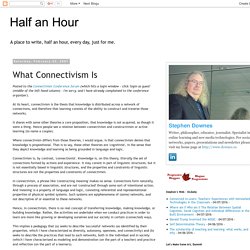
At its heart, connectivism is the thesis that knowledge is distributed across a network of connections, and therefore that learning consists of the ability to construct and traverse those networks. It shares with some other theories a core proposition, that knowledge is not acquired, as though it were a thing.
Hence people see a relation between connectivism and constructivism or active learning (to name a couple). Jan05_01. Editor’s Note: This is a milestone article that deserves careful study.
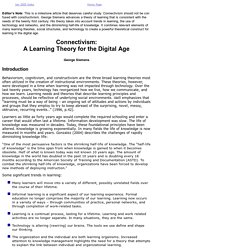
Connectivism should not be con fused with constructivism. George Siemens advances a theory of learning that is consistent with the needs of the twenty first century. His theory takes into account trends in learning, the use of technology and networks, and the diminishing half-life of knowledge. It combines relevant elements of many learning theories, social structures, and technology to create a powerful theoretical construct for learning in the digital age. Making Sense of MOOCs: Musings in a Maze of Myth, Paradox and Possibility.
The challenges to connectivist learning on open online networks: Learning experiences during a massive open online course. Special Issue - Connectivism: Design and Delivery of Social Networked Learning Rita Kop National Research Council of Canada Abstract Self-directed learning on open online networks is now a possibility as communication and resources can be combined to create learning environments.
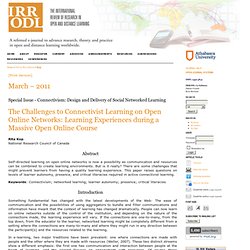
But is it really? There are some challenges that might prevent learners from having a quality learning experience. Overblown-Claims-of-Failure Watch: How Not to Gauge the Success of Online Courses - Rebecca J. Rosen. Online courses are experiencing sky-high dropout rates, and that's probably a good thing.
Rido/Shutterstock Last summer, when Stanford announced its free, online artificial intelligence course, much of the attention celebrated just how *many* people would be able to partake of the intellectual delights normally reserved for the Stanford student body. "Virtual and Artificial, but 58,000 Want Course," the New York Times announced. The story led, "A free online course at Stanford University on artificial intelligence, to be taught this fall by two leading experts from Silicon Valley, has attracted more than 58,000 students around the globe -- a class nearly four times the size of Stanford's entire student body.
" The number of those enrolled would eventually top out at 160,000 students, and other online courses followed suit, trumpeting one by one the massive numbers of people wanting to get in on the goods. Stephen Downes: The Role of the Educator. How often do we read about the importance of teachers in education?
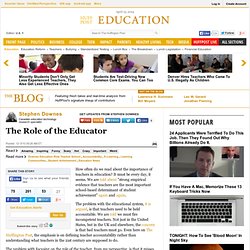
It must be every day, it seems. We are told about "strong empirical evidence that teachers are the most important school-based determinant of student achievement" again and again. The problem with the educational system, it is argued, is that teachers need to be held accountable. We are told we must fire incompetent teachers.
Learning objects. Activity 7: Exploring OER issues. An increasing number of public institutions and private organizations are supporting Open Education Resources (OERs) to make knowledge and learning available to educators and students alike.
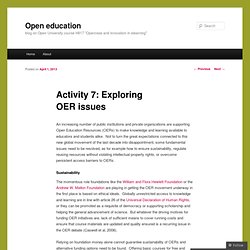
Not to turn the great expectations connected to this new global movement of the last decade into disappointment, some fundamental issues need to be resolved, as for example how to ensure sustainability, regulate reusing resources without violating intellectual property rights, or overcome persistent access barriers to OERs. The momentous role foundations like the William and Flora Hewlett Foundation or the Andrew W. Mellon Foundation are playing in getting the OER movement underway in the first place is based on ethical ideals. OER KnowledgeCloud. The UNESCO Chair on Open Technologies for Open Educational Resources and Open Learning has funded the filming of five regional consultations on OER leading to the 2nd International Summit on OER in Ljubljana in September.
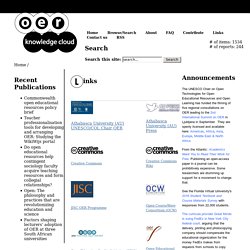
They are openly licensed and available here: Americas, Africa, Asia, Europe, Middle East & North Africa From the Atlantic: Academics Want You to Read Their Work for Free. Publishing an open-access paper in a journal can be prohibitively expensive. Some researchers are drumming up support for a movement to change that. See the Florida Virtual University's 2016 Student Textbook and Course Materials Survey with responses from 22,000 students. The curricula provider Great Minds is suing FedEx in New York City federal court, arguing that the delivery, printing and photocopying company should compensate the educational organization for the money FedEx makes from requests from schools to copy materials that Great Minds created and makes available for free, on an open license.
Creative%20Commons%20and%20The%20Open%20University. The openness-creativity cycle in education. OER. Activity 7: Exploring OER Issues. The three priorities identified in Activity 4 were advances in Web technologies (3.0), content management and curation and quality.
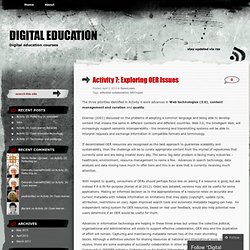
Downes (2001) discussed on the problems of adopting a common language and being able to develop content that means the same in different contexts and different countries.